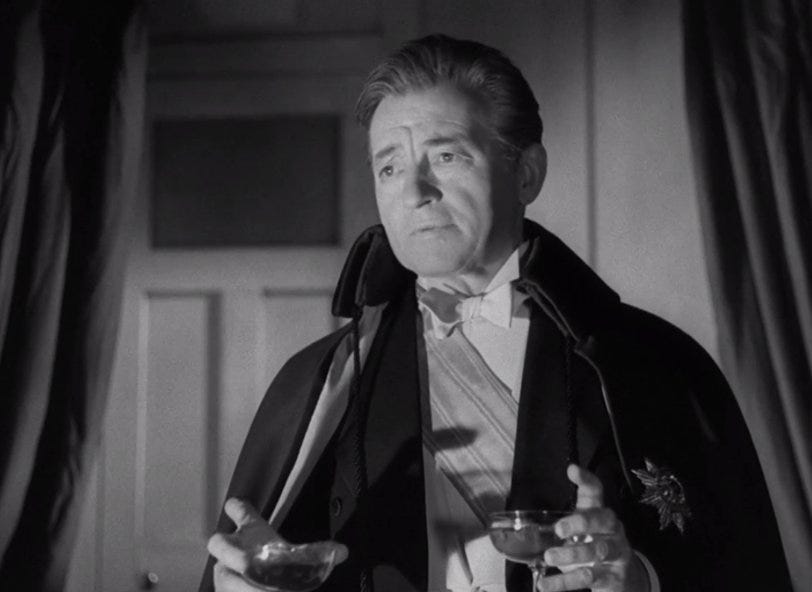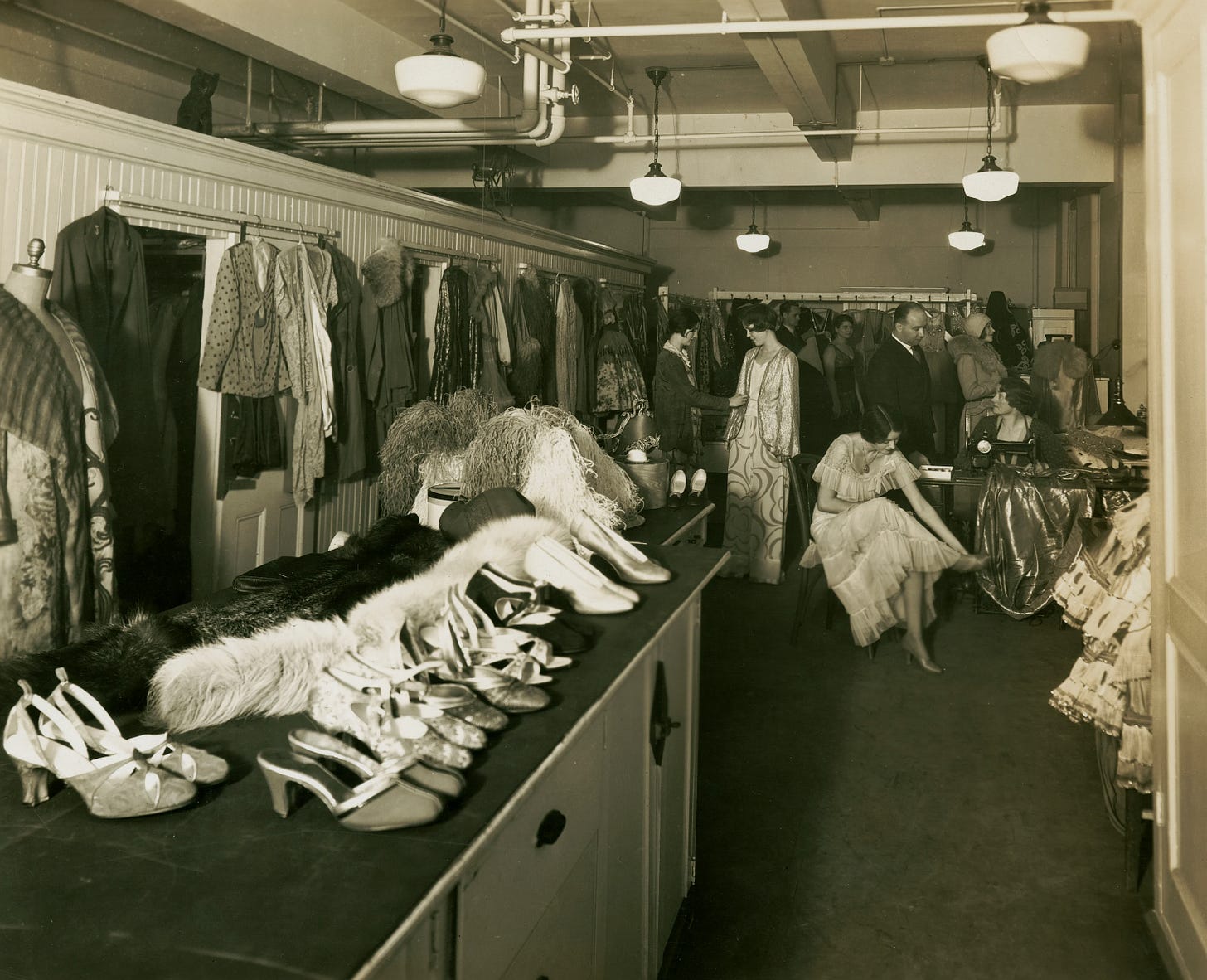“He’s even cooler than Mitchum.” That’s my dad’s verdict on Claude Rains. In this family, no higher praise is possible. My dad and I spend a lot of our time together talking about classic movies—shocker, right? The other day we were discussing John Farrow’s couple-on-the-lam noir Where Danger Lives (1950) and marveling at Claude Rains’s one big scene towards the beginning.
As the long-suffering husband of a femme fatale with borderline tendencies, Rains delivers a stinging revelation to lovelorn Dr. Mitchum. What happens next precipitates the film’s spiral into darkness.
Rains’s challenge is to seem unsympathetic and cruel in the moment, but, in retrospect, come across as a reasonable man pushed to the brink by his wife’s recklessness. We have to remember what Rains said and how he acted later, when the reality of the situation comes to light. He has to cast a long shadow with his short screen time. As a result, his performance operates like a time-release capsule of truth and emotion.
To stay sane over the past week, I’ve been having a mini Claude Rains film festival at home. That’s always time well spent. To honor this Scorpio king (born November 10, 1889), I’m highlighting a few deep-ish cuts from three different decades in his career. All currently streaming online.
Crime Without Passion (1934)
Ace defense lawyer Lee Gentry, the Champion of the Damned, cheats, lies, and manufactures evidence to win acquittals for a murderous clientele. When it comes to women, Gentry revels in getting under their skin so thoroughly that they can’t bear to let him go. “I’m a little bit like Dracula,” he coos in seductive tones. “No life in me, so I need someone else’s soul.”
Gentry wants to jettison his current mistress, nightclub dancer Carmen Brown, in favor of a new conquest. She’s not ready to let go. They quarrel. A fateful accident threatens to land Gentry’s pants in the hot seat. Can his much-lauded criminal mind improvise an airtight alibi?
Written and directed by Ben Hecht and Charles MacArthur and made for Paramount at Astoria Studios, Crime Without Passion flaunts its New York artiness in defiance of Hollywood. Right out of the blocks, it lunges at us with perhaps the trippiest opening of any pre-Code talkie. A gun blasts. A knife falls. Blood drips. Cackling furies in diaphanous shrouds soar across the Manhattan skyline to attack sinners. With the brilliant Lee Garmes behind the camera, the film’s fluid tracking shots and spurts of flamboyant stylization are a match for its virtuoso antihero, a self-described “bag of tricks.”
If ever an actor was born for courtroom pyrotechnics and reams of flowery dialogue, Rains was the man. Rather resembling co-director Hecht, Rains starts the picture as a wickedly precise scoundrel. His preening confidence makes it all the more delicious to watch him unravel. In a series of duets, his composed lawyer mind (superimposed) converses with his increasingly unstrung real-life self. I nominate his Lee Gentry as the pre-Code SOB I’d most like to see going head to head with Lieutenant Columbo. One wonders if the writer of Columbo fan favorite episode “Étude in Black” ever saw this film.
As the unfortunate Carmen, Margo provides a warm, sympathetic counterbalance to Rains’s calculations. Margo is so at ease before a camera, so well matched with Rains that I was surprised to discover this was her first film. Then again, it was only Rains’s second sound movie!
Keep an eye out for a blink-and-you’ll-miss-it cameo by Helen Hayes (Mrs. Charles MacArthur) about 48 minutes in.
Stream Crime Without Passion on Rarefilmm.com
The Passionate Friends (1949)
Arriving in Switzerland for a vacation, Mary is haunted by memories of the love affair she cut short—then briefly rekindled after her marriage to an older banker. “I suppose that if fate were kind and gentle, we would never have met again. But Fate is not kind and gentle,” she muses in voice-over. Indeed, her old flame is at the resort. When their paths cross, will sparks fly again and wreck Mary’s marriage once and for all?
David Lean’s filmography is so full of bangers that this one gets a tad overlooked. It’s overshadowed by the sublime Brief Encounter, but The Passionate Friends has a contemplative elegance all its own. I love this film so much that I held onto a VHS cassette of it for years before it became available digitally.
The Passionate Friends refuses to vilify any player in the eternal triangle. The film never condemns its heroine for choosing luxury over passion. If anything, what we see strongly suggests that romantic, all-encompassing love is no more or less noble than a desire for affection and security.
Instead of moralizing or forcing identification, The Passionate Friends entertains with sensual beauty and a sophisticated exploration of entanglements, not as melodrama plot points but realities that must be lived with. There are so many bittersweet, finely observed moments in this film. Mary’s awkward attempts to make conversation with her husband while watching her ex-lover dance among New Year’s revelers. Her visit to the other man’s apartment where she finds one of her own books on a shelf. The pained husband delicately letting his wife know that he knows she’s having an affair through the strategic placement of a theater program.
Claude Rains gives one of his very best and most understated performances. He could do bombast with the best of ’em, but the impact of his quietness and tact in The Passionate Friends is no less impressive.
Tangent Alert: Phantom Thread-heads will know that The Passionate Friends was a significant influence on Paul Thomas Anderson. When I spoke to Phantom Thread’s costume designer Mark Bridges on a TCMFF red carpet, he told me that Daniel Day-Lewis requested a coat in the style of one Trevor Howard wears in The Passionate Friends. I must say, Howard wore more than his share of bitchin’ coats on film (see also: The Third Man).
Stream The Passionate Friends on The Criterion Channel
The Man Who Watched Trains Go By a.k.a. The Paris Express (1952)
“I’ve always watched other people eating cake,” sighs clerk-turned-crook Kees Popinga. When he goes in for his own slice, however, Popinga finds he likes holding the knife a little too much.
After 18 years of loyal service at a respectable firm, Popinga discovers that his boss is about to skip town with his criminal gains, leaving the company and all its investors in ruin. A flash of rage and temptation changes Popinga’s life forever and he flees on the night train to Paris. There he gets mixed up with a greedy underworld dame who unleashes all the worst parts of his nature.
It seems that this adaptation largely scrubbed out the sordidness of Georges Simenon’s source novel. Nevertheless, as an underseen Technicolor noir, The Man Who Watched Trains Go By has its share of enticements. Rains runs the gamut from pathetic to menacing as a human time bomb that finally detonates. The film’s most interesting scenes, for my money, are shared by Rains and Marius Goring as the detective who quickly forms a rapport with Popinga. Also enjoyable: Märta Torén as the femme fatale who likes to flirt with death and Herbert Lom as Popinga’s pompous, larcenous employer. This would round out a great triple bill of midlife crisis noir with The Suspect (1944) and Scarlet Street (1945).
Stream The Man Who Watched Trains Go By on Tubi
The wardrobe department of Paramount Pictures at the Astoria Studio, c. 1925. Via the Museum of the Moving Image.
Bits & Bobs
Museum of the Moving Image’s primer on the Astoria Studio in New York City, where Hecht and MacArthur made Crime Without Passion (1934). Many fascinating pictures from the studio’s history.
Andrew Nette’s Crime Reads article on Georges Simenon’s standalone hardboiled novels (romans durs), including the source novel of The Man Who Watched Trains Go By.
Bette Davis gushes about Claude Rains and other favorite co-stars to Dick Cavett. Favorite bit: “I always felt, in Voyager, that eventually she married Dr. Jacquith, my gorgeous Claude Rains.” I ship it too, Bette. I ship it too.
Farran Nehme’s appreciation of Rains’s nonpareil side-eye with much evidence in the form of images. Lots of fun links in there too!
Claude Rains—unfiltered. This compilation of his WB bloopers proves that he was just as entertaining when he blew a line and cussed up a storm.
In preparation for the holiday season, I’m upgrading to Blu on The Mystery of Edwin Drood (1935). I like to think of Edwin Drood as The Universal Horror Christmas Special, what with its expressionistic opium dream opening, church crypts, and other ghastly business. In this adaptation of Dickens’s unfinished novel, Rains stars as a drug-addled choirmaster consumed with lust for his nephew’s fiancée. Said nephew goes missing on Christmas Eve, which makes this a traditional Yuletide rewatch in my house.
You will never watch The Adventures of Robin Hood (1938) quite the same way after reading this anecdote about a theory Roddy McDowall had. From David J. Skal’s biography, Claude Rains: An Actor’s Voice.








Love these ideas..! So great thank you!!
Perfect way to start my weekend. Thank you.